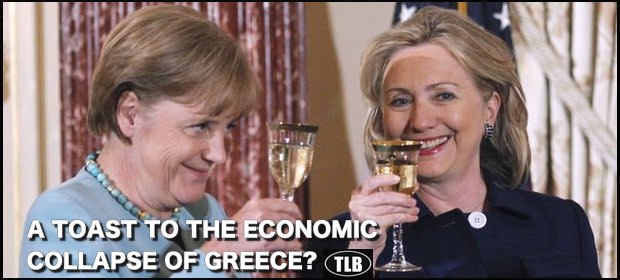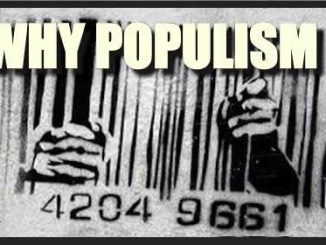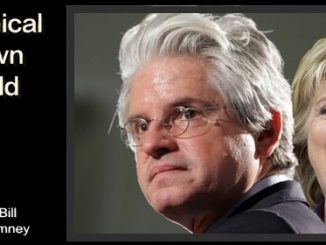
The Clintons Assisted Goldman Sachs And Angela Merkel In The Greek Financial Crisis
WILLIAM CRADDICK
It’s a story that has been told many times in part, but not in total. While Goldman Sachs’ role in helping to create the environment for Greece’s government-debt crisis is well known, less discussion is given to the role the Clinton family played in helping Angela Merkel to consolidate political control of Greece while also assisting Goldman as it continued to benefit from the meltdown once austerity measures had begun. The Clintons appear to have received funds from both Germany and Goldman Sachs during this period.
I. Goldman Sachs Was Responsible For Greece’s Economic Collapse
Goldman Sachs is generally blamed for having a hand in intentionally causing Greece’s 2008 financial crisis. Observers have noted that the financial group was instrumental in helping to arrange a secret loan of 2.8 billion euros for Greece, disguised as an off-the-books “cross-currency swap” – a complicated transaction in which Greece’s foreign-currency debt was converted into a domestic-currency obligation  using a fictitious market exchange rate. This allowed Greece to hide 2% of its debt but left it immediately in a much worse position after the effects of 9/11 caused the amount Greece owed to Goldman double.
using a fictitious market exchange rate. This allowed Greece to hide 2% of its debt but left it immediately in a much worse position after the effects of 9/11 caused the amount Greece owed to Goldman double.
Meanwhile, Goldman padded its profits by leveraging Greece as much as possible along with most of the rest of the global economy. It continued this pattern of predatory lending advice in 2005, when they renegotiated the deal with Greece to lock in their debt at a staggering 5.1 billion euros. In 2009, it made another proposal for a financial instrument that would push the debt from Greece’s healthcare system into the future, delaying payment. In the aftermath of its efforts to financially hobble various nations across Europe, Goldman employees have moved into positions of control within Europe’s financial sector. Mario Draghi (pictured), managing director of Goldman’s international division at the time of their negotiations with Greece, has since moved on to become the head of the European Central Bank.
II. The Clintons Helped Goldman Sachs To Continue To Exploit The Greek Crisis Financially
As Greece’s crisis exploded, Goldman associates began to make apparent moves to continue to leverage the situation as much as possible. In 2014, Marc Mezvinsky (pictured), a former Goldman Sachs employee and  husband of Chelsea Clinton, launched Eaglevale Hellenic Opportunity along with two other Goldman employees to attract investors hoping to cash in on Greece’s broadly touted economic recovery. As a former Goldman employee, it is strange that Mezvinsky appeared to be so certain of a Greek recovery, given his relationship to the finance group that laid the foundation for the crisis and knew firsthand how unlikely Greece was to recover. SEC documents reveal that new investors to Eaglevale Hellenic were required to put down at least $2 million. Goldman chief executive Lloyd Blankfein not only invested in the firm, but allowed his association with the fund to be used in its marketing. Hillary Clinton has refused to comment on how much Blankfein invested in Eaglevale Hellenic. At a time where Greece’s financial woes were not only well known to Goldman Sachs, but becoming increasingly obvious to the world, the Eaglevale fund bears alarming signs of being a blatant attempt to steal cash from unwitting investors too foolish to see the writing on the wall.
husband of Chelsea Clinton, launched Eaglevale Hellenic Opportunity along with two other Goldman employees to attract investors hoping to cash in on Greece’s broadly touted economic recovery. As a former Goldman employee, it is strange that Mezvinsky appeared to be so certain of a Greek recovery, given his relationship to the finance group that laid the foundation for the crisis and knew firsthand how unlikely Greece was to recover. SEC documents reveal that new investors to Eaglevale Hellenic were required to put down at least $2 million. Goldman chief executive Lloyd Blankfein not only invested in the firm, but allowed his association with the fund to be used in its marketing. Hillary Clinton has refused to comment on how much Blankfein invested in Eaglevale Hellenic. At a time where Greece’s financial woes were not only well known to Goldman Sachs, but becoming increasingly obvious to the world, the Eaglevale fund bears alarming signs of being a blatant attempt to steal cash from unwitting investors too foolish to see the writing on the wall.
The Clintons were receiving inside information that would have kept them incredibly well informed about the Greek crisis. Gary Gensler, former co-head of finance at Goldman Sachs and the financial director of Clinton’s 2016 election campaign was revealed in Wikileaks Hillary Clinton Email Archives to have been sending Clinton inside information on Greece’s recover prospects while he was acting as the head of the U.S. Commodity Futures Trading Commission (CFTC) in 2011. In 2012, Sydney Blumenthal emailedClinton classified information about German leadership’s thoughts on further potential bailouts for Greece which apparently had been acquired by a “sensitive source” working undercover within the German government. While receiving some of this information was part of Clinton’s job as Secretary of State, her close relationship to Goldman Sachs and her son in law’s Greek fund raises very clear questions about potential conflicts of interest.
III. The Clintons Helped Germany Consolidate Political Control Of Greece By Encouraging Austerity
As Greece began to react negatively to austerity demands made by Germany during its first two successive bailouts of the financially embattled nation, the Clintons worked to ensure that Greece did not leave the Eurozone and continued to accept austerity measures even when these actions did not benefit  the German and Greek people. By January 2015, Greeks were tired of increasingly demanding German financial bailouts and elected Alexis Tsipras (pictured) as Prime Minister after he promised to resist further austerity measures. The media was awash with rumors that Greece would leave the Eurozone in a “Grexit.” By early July, emails from Wikileaks Podesta Files showed that the Clinton camp was working to ensure that Greece remained in the EU and suggested that Bill Clinton speak directly with Prime Minister Tsipras to prevent Grexit.
the German and Greek people. By January 2015, Greeks were tired of increasingly demanding German financial bailouts and elected Alexis Tsipras (pictured) as Prime Minister after he promised to resist further austerity measures. The media was awash with rumors that Greece would leave the Eurozone in a “Grexit.” By early July, emails from Wikileaks Podesta Files showed that the Clinton camp was working to ensure that Greece remained in the EU and suggested that Bill Clinton speak directly with Prime Minister Tsipras to prevent Grexit.
On July 10, just days after the first flurry of emails worrying about a potential Grexit, CNN reported that German Chancellor Angela Merkel was inclined to listen to the demands of German voters and say no to another round of austerity. Later on the same day, Bill Clinton’s foreign policy advisor and Hillary  Clinton associate John Podesta (pictured) were included in an email chain discussing disapproval of Merkel’s decision and decided that Mr. Clinton should call Merkel to “suggest” a change of course. Just nine days after this email was sent, the BBC reported that Merkel was “flip flopping” and would consider a third round of austerity measures for Greece. The austerity measures were criticized as being far too generous to Greece and not being in the best interest of German taxpayers. The multiple measures of austerity ultimately reduced Greek sovereignty and increased their reliance upon the EU.
Clinton associate John Podesta (pictured) were included in an email chain discussing disapproval of Merkel’s decision and decided that Mr. Clinton should call Merkel to “suggest” a change of course. Just nine days after this email was sent, the BBC reported that Merkel was “flip flopping” and would consider a third round of austerity measures for Greece. The austerity measures were criticized as being far too generous to Greece and not being in the best interest of German taxpayers. The multiple measures of austerity ultimately reduced Greek sovereignty and increased their reliance upon the EU.
IV. The Clintons Received Apparent Compensation From Goldman Sachs And Germany For Their Work
The Clintons not only held improperly close financial and familial relationships to individuals associated with the finance group that caused Greece’s crisis, but also apparently assisted Angela Merkel in consolidating German control over the EU and forcing certain states such as Greece to become increasingly dependent upon the union. In both cases, they appear to have been compensated handsomely for the roles they played.
Goldman’s role in creating the Greek crisis and Mezvinsky’s attempts to attract cash to what savvy investors should have seen as a doomed venture raises new questions about the hundreds of millions paid to the Clintons by Goldman for “speaking events” from 2001 to 2016, the exact same time that Goldman Sachs was involved with helping lay the foundation for Greece’s collapse. Some of these speeches occurred after Eaglevale Hellenic Opportunity opened its doors in 2014.
 Germany also made significant donations to the Clinton Foundation and Hillary Clinton’s election campaign. In February 2015, at the same time Tsipras was pushing for an end to austerity measures, the German government was revealed in Wikileaks emails to be among foreign governments who were “recent donors” to the Clinton Foundation. Clinton insiders frequently worried about whether the foreign donations might be perceived as unethical or illegal. It has since been revealed that Germany gave nearly £4 million in taxpayer’s money to the Clinton Foundation during the height of the 2016 U.S. presidential election.
Germany also made significant donations to the Clinton Foundation and Hillary Clinton’s election campaign. In February 2015, at the same time Tsipras was pushing for an end to austerity measures, the German government was revealed in Wikileaks emails to be among foreign governments who were “recent donors” to the Clinton Foundation. Clinton insiders frequently worried about whether the foreign donations might be perceived as unethical or illegal. It has since been revealed that Germany gave nearly £4 million in taxpayer’s money to the Clinton Foundation during the height of the 2016 U.S. presidential election.
Angela Merkel’s attempts to retain control over Greece through austerity have been just one of a number of measures to consolidate and centralize power in the European Union. In January 2017, Disobedient Media reported on accelerated efforts to create an EU Army, which would cause substantial financial, military and political burdens for European states.
*********
TLB recommends you be Disobedient and visit Disobedient Media.com for other pertinent articles.
 Find out about our great (WOW) TLB Project Membership package and benefits, add your voice and help us to change the world!
Find out about our great (WOW) TLB Project Membership package and benefits, add your voice and help us to change the world!




